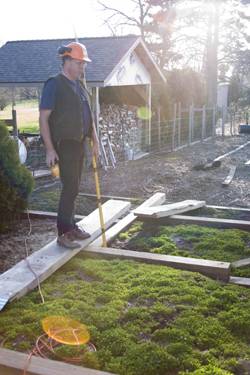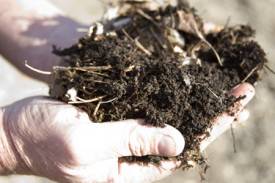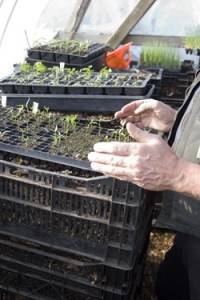Tuesday afternoon, April, the sun is hovering low in the sky, and the chill of winter is making way for the warm embrace of Spring. I am looking for Nature’s Finest, Inc., driving down smooth paved roads through cornfields of south Champaign. I drive by a small house, surrounded by what appears to be an explosion of wild growth, skeletal outbuildings, and a barking dog. A man holding some sort of saw on a long pole is cutting at a tree. I keep driving. My directions must be wrong.
I call Greg. Yes, that was it. That wild two-and-a-half acres is Nature’s Finest, and that man with the scary tool is Greg Smith, sustainable living extraordinaire!
 Greg and his wife, Ruth, have run Arborsmith for 30+ years, but gardening is his first love. My goal in this meeting is to learn how sustainable living, in other words, small-scale farming, is possible. Is it possible? I ask Greg.
Greg and his wife, Ruth, have run Arborsmith for 30+ years, but gardening is his first love. My goal in this meeting is to learn how sustainable living, in other words, small-scale farming, is possible. Is it possible? I ask Greg.
Greg: “Gardening is my love, but it’s difficult to make a good living at it.”
Damn, I think. Not that I plan on quitting my job and turning a profit in beets, but in meeting Greg and his beautiful plot of land, I want him to succeed. I want this tiny corner of our city to flourish – I want quality to pay for itself.
Greg: “Sustainability is a philosophy. If we’re more concerned about making money, we’ll never make enough. That can’t be the goal. The goal is to do things right, and have good relationships with customers. The money will work out. You can do a lot with free, or “almost free,” if you’re willing to work.”
By free, Greg means shared. Community sharing of goods, information, products, etc.
Greg: “People who are nurturers — anyone involved in making something else healthy — they’re very free with information. A relationship account is as valuable as a cash account. You have to be very frugal and thoughtful. You have to be creative in your marketing. The goal is to do things right, and have good customers, and have good relationships with customers.”
So, my question remains: how can someone like me create sustainable living? According to Greg, we must find our niche. He also suggests first working as an apprentice.
Greg: “Someone starting out has to find the niche that fits them. If a person has an interest, there’s unlimited potential. Second income, retirement income, a way to spend more time with family.
Greg takes me on an in-depth tour of his small farm. I am amazed at everything going on in such a small space. Greg tells me that sustainability is about layering — finding multiple uses for everything from water to worms.
 Greg: “How can we make synergy — and synergy is really the key word — sustainable. Some people call it ‘stacking,’ where you get multiple uses out of several resources. The way to make sustainability work is dual-purpose materials. We make ramial-chipped wood. Ramial chipped wood (the process of taking twigs and branches and chipping them into small pieces) improves the soil, mulches, keeps the weeds down and holds moisture. It has several layers of benefit.”
Greg: “How can we make synergy — and synergy is really the key word — sustainable. Some people call it ‘stacking,’ where you get multiple uses out of several resources. The way to make sustainability work is dual-purpose materials. We make ramial-chipped wood. Ramial chipped wood (the process of taking twigs and branches and chipping them into small pieces) improves the soil, mulches, keeps the weeds down and holds moisture. It has several layers of benefit.”
 Nature’s Finest also makes worm compost. Worm bins are stacked, and on top of that is placed a flat of flowers or vegetables.
Nature’s Finest also makes worm compost. Worm bins are stacked, and on top of that is placed a flat of flowers or vegetables.
Greg: “When I water the vegetables, that water drips down and goes into the worm bin. So I’m getting two uses out of one watering. That, to me, is the economic way that you make sustainability work.”
I ask how someone like me, who is interested in sustainable living, can get started.
Greg: “The amount of capital needed to be a gardener is a pickup truck and that’s it. Learn to work with what you have; let the land dictate your direction. Part of sustainability is to try things and learn from your failures. You must be future-thinking. Take things a step at a time.”
He shows me a collapsed hoop house. It looks like wet cotton discarded on a pile of mud. He explains how they grew tomatoes from seeds and planted early. The hoop house is to keep them warm at night. Unfortunately, a storm came through last night, and though they have a wall to protect the vegetables from wind, this storm came from the east.
Greg: “We grew tomatoes from seeds so it’s not a loss, it’s just an experience.”
I begin to understand the philosophy. Sustainability is about much more than growing vegetables to feed our families; it is about nurture. It’s about caring for our land and as a result, caring for ourselves.
Greg: “So far I’ve told you ten million things, which is part of the negative of sustainability. It’s very complex; everything inter-relates. A little bit is that you go on faith. It’s a challenge making the economics of it work. The disadvantage is that we’re small; the advantage is that we’re small. Bigger isn’t necessarily better for the country. The stability of an integrated farm is much greater.”
I am inspired, to say the least. Greg Smith is a wealth of information — eager to share for the betterment of our community. I encourage you to call, Greg, He can be reached at 217.202.7490.
— —
What Nature’s Finest can do for you:
Nature’s Finest helps other people develop their property in a perma-culture way. They have multiple examples on their land to show you the many ways you can develop your own land. They hope to one day have a produce stand and deliver vegetables by bicycle. Greg says, “We chose the name Nature’s Finest because it identifies that nature and the natural systems that keep insects from becoming pests are the finest. Our job is to better understand the natural systems, and put the weaknesses and strengths of that system to work for us.”








